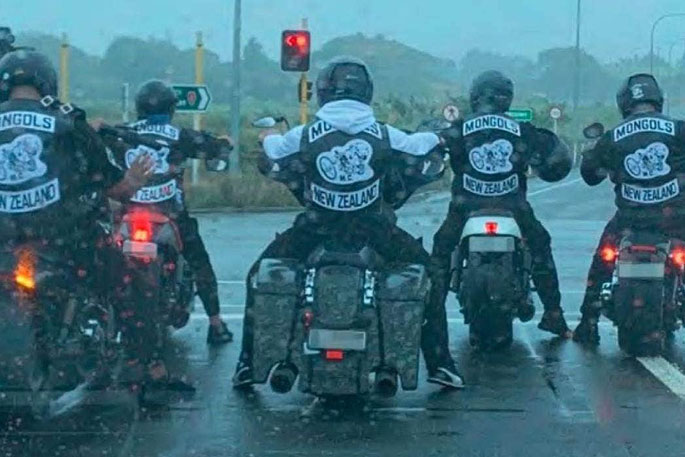'Loose lips sink ships” – but whether the interception of covert conversations on an unsecured phone has effectively doomed the maiden voyage of a newly-established motorcycle gang remains to be seen.
The credibility of a secret witness – a former member of the Mongols who turned against them – is another major factor that determines the guilt or otherwise of nine senior members and affiliates of the gang, a Crown prosecutor has told a High Court jury during her closing address.
The nine are currently standing trial in Hamilton on a raft of drugs and weapons charges.
Following a covert surveillance operation, police arrested the entire senior hierarchy of the gang in June 2020.
At the time, the police said a gang war was brewing in the Bay of Plenty region, with numerous groups battling for the lion's share of the drug market there.
Among those on trial is the Mongols' national president, Jim David Thacker, also known as JD; sergeant-at-arms Leon 'Wolf” Huritu; Jason '666” Ross; Kelly 'Rhino” Petrowski; Hone 'One-er” Ronaki; Matthew Ramsden; Kane Ronaki; Te Reneti Tarau; and another man who has interim name suppression.
One of the main points of the Crown case against the nine men - that prosecutor Anna Pollett was quick to convey to the jury - was the tranche of monitored and recorded phone calls the gang's vice president Hone Ronaki made and received on his personal phone.
Other members of the gang made use of specialised 'cypher” phones or encrypted messaging apps to make their alleged drug and gun deals – but not him.
'You might say loose lips sink ships. Mr Ronaki let the side down by using his own phone,” Pollett told the jurors.
Pollett also forewarned the jury the secret witness – who operated with the gang under the code name 'Wheelman” – would likely have his credibility called into question by the nine defence lawyers acting for the defendants.
'It may be suggested [the secret witness] has made everything up to maintain immunity; that he has some beef with the group.
'[The witness] was a knowledgeable witness who gave credible evidence. This is not the sort of material you could fabricate without first-hand knowledge of what occurred.”
The witness had also acknowledged 'his own wrongdoings” and the Crown realised there was much that would not cast him in a good light.
'What is inescapable is that his evidence was detailed in the extreme ... He could nearly be qualified himself as an expert in the activities of the criminal group.”
Pollett launched into the Crown closing by recounting the circumstances behind the formation of the gang.
The chain of events began in September and October 2018, when Thacker and Hone Ronaki, who were members of a Bandidos motorcycle gang in Queensland, Australia, were deported to New Zealand under the controversial 501 law.
Fellow Bandidos Huritu and Petrowski came to New Zealand soon after, and the four men set about establishing a chapter of that gang in the Bay of Plenty.
One of their brethren was beaten up by a group of Bandidos members in Christchurch, and Thacker, Hone Ronaki and another man had travelled to the southern city to mete out some violent retribution.
However, the fracas had displeased 'the higher-ups” back in Australia and the Bay of Plenty members were 'depatched”.
Rather than giving up on gang life, Thacker and his colleagues adopted the Mongols branding – the first such chapter in New Zealand – and set about making it an influential force.
Thacker was named the gang's president, Hone Ronaki the vice president; Huritu the sergeant-at-arms; and Petrowski the secretary/treasurer, Pollett said.
An Auckland chapter was subsequently set up, followed by a Christchurch chapter led by Ross – a leader of the rival Hell's Angels gang who decided to be 'patched over” to join the Mongols.
About 40 other Christchurch-based Hell's Angels members followed suit, Pollett said.
'What this trial is about is the activities in the establishment phase in New Zealand, and what was achieved thereafter until June 2020.
'The group were able to grow the enterprise. They had access to kilograms of methamphetamine, and also the means to accumulate a serious cache of arms.”
The trial continues.



2 comments
Fascinating.
Posted on 02-11-2022 13:33 | By morepork
Like watching a cancer spread. I wonder if our Justice System is capable of doing the necessary surgery.
give them a cream cake
Posted on 02-11-2022 17:48 | By dave4u
And tell them BE good boys Please and go back to your happy Pad
Leave a Comment
You must be logged in to make a comment.